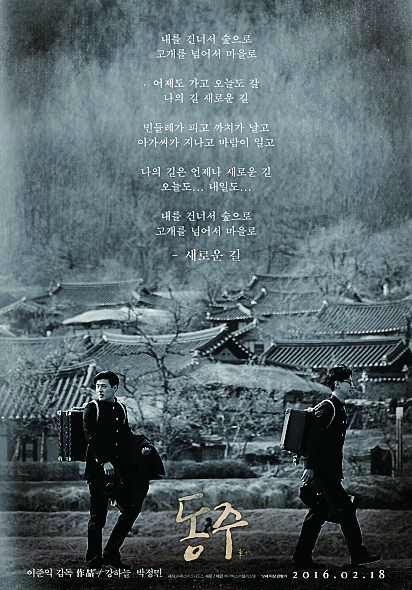During the Japanese colonial period, a lot of people struggled to keep their country from Japan. All of the people who sacrificed themselves for Korea deserve admiration, but specifically some people who devoted their lives to our country are known as heroes: Yu Gwan-sun and Yoon Dong-ju. Each of these heroes’ lives have been illustrated in a movie. By watching these films, we can empathize with their passion and strong will.
A Resistance, 2019

This movie covers Yu Gwan-sun’s life after she was put behind bars. After the March 1st Independence Movement, 1919, she was arrested and sentenced to three years in Seodaemun Prison. Dozens of activists were trapped in a cramped room. In the room, there was a senior member of Ewha School, an elderly woman, and even a pregnant woman.
On the first anniversary of the March 1st Independence Movement, Yu Gwan-sun read the Declaration of Independence aloud again in prison and shouted “Long live Korean independence.” In response to this, more than 3,000 prisoners were greeted with loud cheers, as crowds of people gathered around the prison to shout it together. Soon after being taken as the movement’s leader, Yu Gwan-sun was tortured, but she refused to give in to Japan. When one of her torturers sexually abused her and beat her stomach so hard that she suffered a ruptured bladder and womb, she was only eighteen years old. On 28 April 1920, she had her sentence reduced to a year and a half, but she died two days before her release: her death was a result of torture and malnutrition.
Yu Gwan-sun also witnessed her parents’ death right in front of her during the brutal uprising. Despite the nonviolent movement, the death toll was over 4,000 people at that time. Nevertheless, she did not back down from the independence movement.
Great men have been born in difficult situations. This movie shows the courageous cries of countless women we didn’t know. Dozens of women trapped in Room 8 feared but shouted for their independence. We can learn that one courageous person can move thousands. Now, we are leading prosperous lives in a safe country, thanks to these sacrifices of our predecessors, and we must never forget them.

DongJu; The Portrait of A Poet, 2015
This movie draws on the lives of two people: Yoon Dong-ju and his cousin Song Mong-gyu. They were born two years before the March 1st Independence Movement in 1919. Based on the recommendation of a professor whom they met at university, the two decided to go to Japan to study. Yoon Dong-ju met several people in Japan and planned to publish a book of poems with a professor who opposed Japan’s imperialism. In the midst of World War II, Japan forced Koreans to change their names into Japanese styles and banned the education of Korean language to conscript Koreans for the war. Song Mong-kyu, who had an enterprising spirit, designed a plan for a rebellion within the Japanese army. However, he was arrested for educating and enlightening Koreans, and Yoon Dong-ju was also arrested for publishing his book of poems. In the Fukuoka prison, Yoon Dong-ju was getting weaker and eventually died after getting unknown injections every day. Six months after his death, Japan lost the war and Korea became independent. Over 1,800 people died after receiving unknown injections in the prison.
Yoon Dong-ju was not just a man who sacrificed his life to fight for independence; he was a man who stood up to Japan. He objected to Japan’s forced conscription and was ashamed of changing his name. Unlike Song Mong-gyu, Yoon Dong-ju was an activist who took up a pen, wrote poems against Japan, and reflected upon his life until he died.


